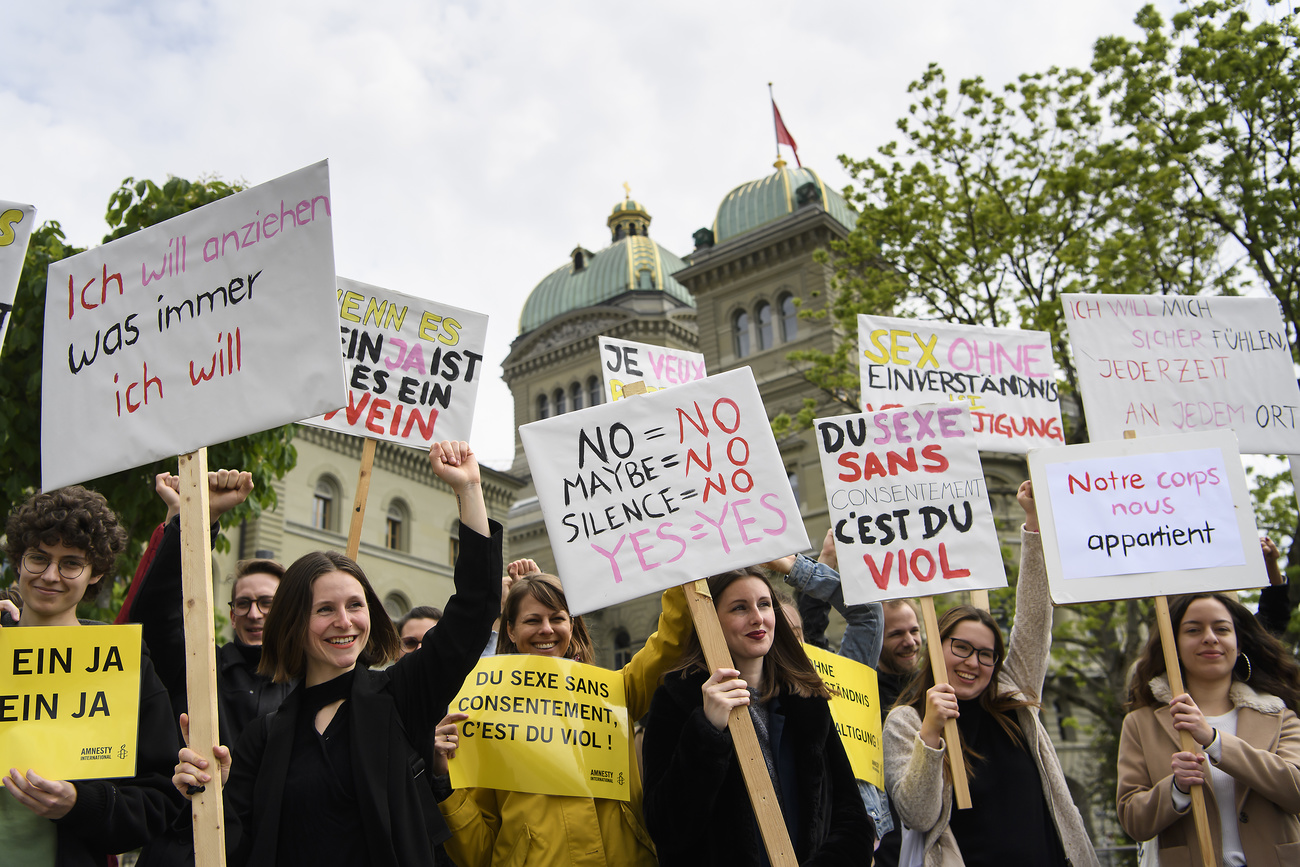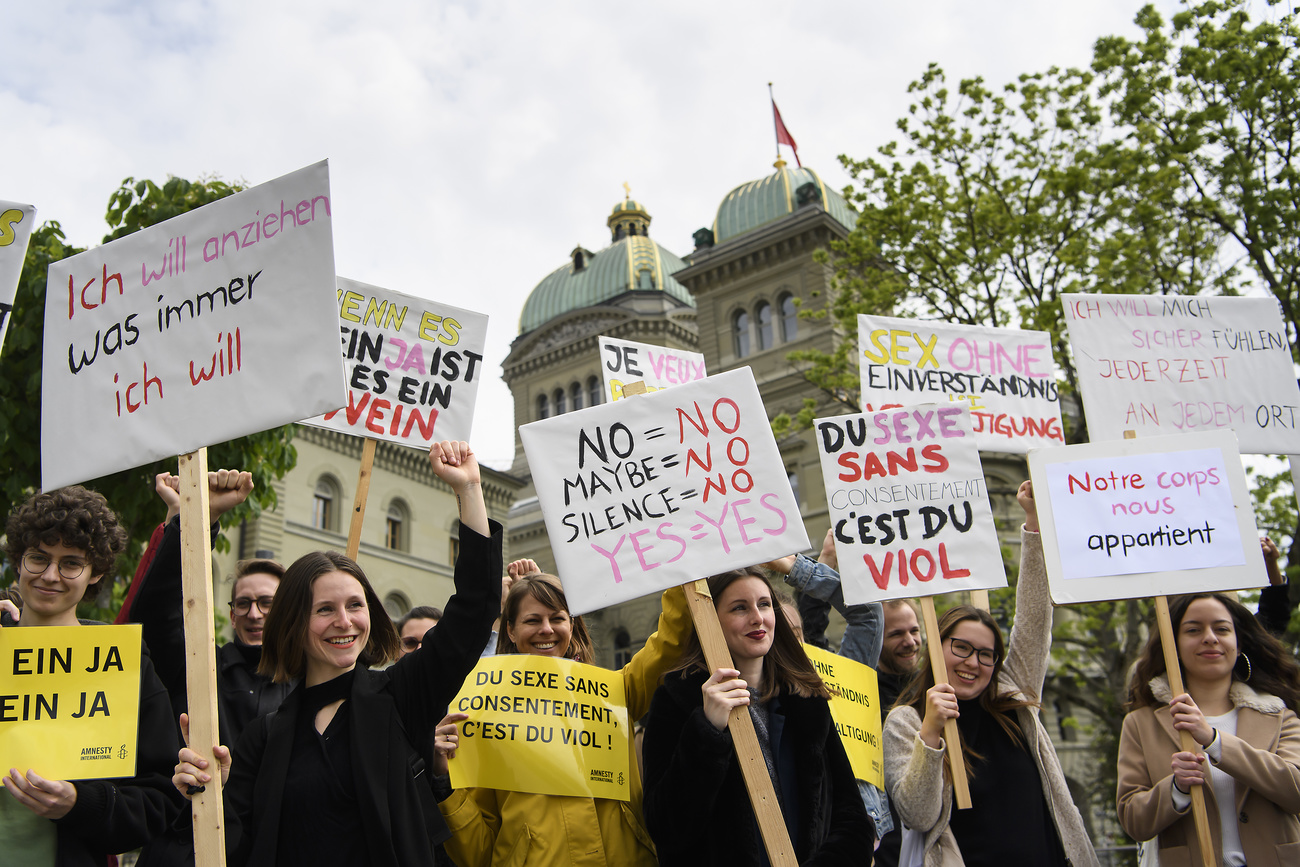How a new definition of rape could impact Swiss law

An increasing number of countries define rape as sex without consent – even if no force is used. This new definition could influence a revision to Swiss criminal law.
As in many other countries, Switzerland only defines rape as forced sex involving violence, threats or psychological pressure. Similar rules apply in China, Russia, France and Spain, just to name a few countries. This means that in certain situations, unless a woman specifically defends herself, her aggressor will be charged with “sexual harassment” rather than “rape”.
Sex without consent must be punished
This is changing in many countries in Europe. In Spain, the penal code is due to be adapted in accordance with the Istanbul ConventionExternal link which is aimed at combating violence against women. Among the requirements of this agreement by the Council of Europe are penalties for sex without consent. The debate in Spain was reignited by a concrete case: a group of men violated a young woman, filmed the crime and distributed the video via Whatsapp. Although the men openly boasted about their crime, they got off with relatively light punishments. The victim hadn’t fought back physically, so the assault didn’t count as rape.
Similar steps to change the penal code are under discussion in Denmark, the Netherlands and Finland. Meanwhile countries such as Sweden, Britain and Germany have already taken steps to define rape as sex without consent.
In Switzerland, the Istanbul Convention took effect in 2018. Since then, the country has been working to comply with its requirements but has stopped short of changing the definition of rape. NGOs such as Amnesty International and feminist and women’s rights groups have been pushing for more. The debate has reached the Federal Office of Justice, which is currently examining whether there is a need for further reform in Switzerland.

More
Women demand better protection against sexual violence
“The debate is often sparked by concrete cases, as it was in Spain,” said Nora ScheideggerExternal link, a researcher at the Max Planck Institute in Freiburg, Germany, who wrote her doctorate about Swiss sex-crime law.
“The feminist movement initiated the debate in this country in the 1980s. After that, the debate faded into the background, until the Istanbul Convention and the #MeToo movement gave it new momentum,” Scheidegger added.
Marija Pejčinović Burić, the general secretary of the Council of Europe, has also called on member states to revise the definition in their penal law. Initially, the Swiss government saw no need for a revision. Someone who ignores a “no” in Switzerland does not go unpunished and can be penalised for sexual harassmentExternal link.
Proposal for a new criminal offence
Scheidegger argues, however, that the current definition of “sex without consent” is too mild and imprecise in Swiss law. In her doctorate she proposed the introduction of a new offence: “sexual assault”. Her proposal has been taken up by a member of parliament and may become reality if the Federal Office of Justice decides to send it for consultation.
Other countries have mostly decided to broaden the definition, so what would be the advantage of adding a new criminal offence?
“The term ‘rape’ is emotionally charged. It is viewed as one of the worst crimes there is,” Scheidegger argued. “As long as that is the case, it makes sense to reserve the term rape for the most injurious offences.” She makes a clear distinction between forcing someone to have sex and just ignoring a “no”.

More
One in five Swiss women has been a victim of sexual violence
“Forcing someone to have sex is an extremely egregious wrongdoing, but violating sexual self-determination is also a serious wrong,” she adds.
According to Martino MonaExternal link, a professor of criminal law at Bern University, the use-of-force requirement in rape convictions has historic reasons. “In the 19th century, a rape victim risked criminal prosecution for sexual relations outside marriage, so the use of force was evidence that the woman didn’t give consent.” Today this is no longer relevant because society has changed. For that reason, he said, it’s an abnormality that the penal code is still based on an outdated understanding of morality and sexuality.
Fear of false accusations
In the parliamentary debate, two arguments have been introduced against using the term consent. One is the concern that the accused person has to prove consent retroactively, which would be the equivalent of reversing the burden of proof and is therefore contrary to the rule of law.
Secondly, there are also fears that if the victim only needs to testify that he or she didn’t given consent, this could provide an incentive for false accusations. The phenomenon of false or fabricated rape accusations does already exist, although there are no reliable figures for Switzerland.
Recent research in countries such as Britain where sex without consent is considered rape, shows that false accusations have not gone up dramatically. In Britain penetration without consent counts as rape. The victim doesn’t have to fight back; what is decisive is that he or she didn’t give consent for sex.
“There are still few prosecutions because of the difficulty in proving ‘beyond all reasonable doubt’ the victim did not consent,” said Jonathan Herring, a legal professor at Oxford University.
“The problem is that juries still believe in ‘rape myths,’ eg. that the victim who is drunk or in a club is consenting to sex.”
Scheidegger also warns against raising false hopes for victims: “The problem of proof remains,” she said. The fact that someone has said ‘no’ is much harder to prove than visible evidence of violence from forced sex.

In compliance with the JTI standards
More: SWI swissinfo.ch certified by the Journalism Trust Initiative











Join the conversation!